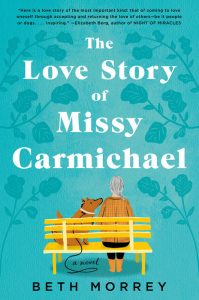
A “coming of old” love story for all ages (London, present-day; Cambridge University, 1950s and later): For everyone who could use a friend, a dog, or the kindness of strangers in the isolated world we find ourselves living in right now, The Love Story of Missy Carmichael delivers all three. Heartbreaking and heartwarming, affirming life as Missy discovers different forms of love and home.
Palpably lonely, seventy-nine-year-old British Missy graduated from one of the world’s greatest and oldest universities, Cambridge outside London, where she worked in their Classical Faculty Library as an archivist. She gave that stimulating life up when she married Leo, because he “felt like home.” Sensing she shouldn’t let her light interfere with his “sun-light quality,” he rose to become a famous professor, thrived on the adulation, while she “drowned in the dreary call of child care.” He’d had an affair before they got involved, which, rightly or wrongly, haunted Missy for the rest of their time together, fearing she’d lose him. If only Missy loved herself the way Leo loved himself. You’ll come to resent his self-centeredness, ignoring how much she sacrificed for him. She did her best at mothering two very different children: Melanie, “her cross” crying all the time, and Alistair/Ali, “her balm.”
Now Leo is gone, and she’s estranged from Melanie for the past year (after a terrible fight alluded to you’ll eventually learn what that’s all about), so she feels gone too. The last straw was when darling Ali moved to Australia three years ago with her “golden grandson” Andrew.
All that’s left is Missy lost in their big “time warp” of a relatively-unchanged 1950s house in London. Empty, the house no longer feels like home, stripped of a lifetime of memories and artifacts hidden in the attic, too painful to be reminded of. “Like other unmentionable things, it must be rolled up, stuffed away and forgotten,” she says, but the heart does not forget.
That’s the Missy we meet in this emotionally pitch-perfect novel by debut author Beth Morrey, who knows her way around writing and creativity as a former producer for Britain’s RDF Television.
That sparsely decorated house is where you’ll find Missy most days, going weeks before talking to anyone. Which is why it can take her a week to come up with anything to email Ali about, worried he’ll think her “trivial.” Why did Missy allow her world to become so limited? She doesn’t want to think about that, yet the novel is full of her bittersweet recollections.
The Missy who greets us is suffering from “abstract, galactic isolation” like all the quarantined people around the globe are understanding like never before. “My loneliness, my emptiness, was a balloon that bobbed and dragged me away.”
Losing and finding “home and hearth” sums up Missy’s late-in-life story. Defined in Missy’s classically-trained mind as oikos, “an important concept in Ancient Greece.”
“How big a family did one need to achieve it?” Can you find Home – love, belonging, connectedness – outside your immediate family? Missy’s answer comes out-of-the-blue from unlikely friendships and one very special dog.
Dogs are absolutely central to Missy’s story. Dogs make sure we get outdoors. Dog walkers know they’re ice-breakers for people like Missy who “craved the comfort of human contact.” Clichéd but they really are man’s best friend. Unconditionally loving us, dogs worm their way into ours hearts, always crazy-wagging-tail happy to see us. Some dogs are more special than others. Those are the ones who become companions we cannot imagine living without. Missy could use a dog for all those reasons.
The idea of a dog is triggered when the novel opens on a day when Missy forced herself to get out of the house to take a walk in the neighborhood park, “to clutch on to that last vestige of an inquiring mind, stop it from slipping away.” The weather wasn’t pleasant; she was motivated by the outlandish event cited in the opening sentence: “It was bitterly cold, the day of fish-stunning.” Reading that line you might think you opened the wrong book! Be glad you were curious to read on (then a great one-liner) as you’ll learn that odd fish reference really happened at Cambridge University, among others.
Cambridge fills a lot of Missy’s memories as this was where she allowed herself to have some fun, where she met Leo.
At the park, Missy collapses and a stranger comes to her rescue: forties Sylvie whose “joie de vivre” and “elegant Georgian house” (she’s an interior designer) the opposite of Missy. Sylvie is one of the dog walkers in the park, adores her two fluffy “dove-blue” dogs, Nancy and Decca. While tending to Missy helped onto a bench a friend of Sylvie’s bounces by: activist journalist Angela whose red-hair fits her hot personality. She’s chasing after her rambunctiously lovable son Otis, a little older than Missy’s Andrew.
Meeting them slowly affects Missy’s misery as they offer kindness, empathy, friendship. Offering, as defined by another Greek word, entheos, “the Greek buzz of enthusiasm.”
Once Missy recovers, Sylvie and Angela invite her to join them for coffee at a cafe Missy sometimes frequents alone, when she dares to leave her house. Overwhelmed they’ve asked her to come along, she’s worried, pathetically, that if she says yes she will “look too eager.” Too desperate, which she is.
Soon after, she’s invited to Sylvie’s kitchen where her joy in food and design reflect she’s happy with herself. Or “philautia” in Greek, meaning “love of the self.” It’s why Sylvie chose singlehood. Angela and Otis are there too. Late thirties Angela has had enough of marriage, after twelve unhappy years. A caring mother, she’d rather raise Otis by herself in a cramped apartment on a passionate journalist’s salary. Pulled in many directions, she has a lot on her good-hearted mind.
Like caring about a journalist friend going through a messy divorce. Needing a few months to work things out, Angela is determined to help find a foster home for her dog. Angela is not so preoccupied to size up Missy’s home and perceive her loneliness. A win-win solution to help her friend and Missy, maybe. Missy turns her down, until an incident occurs, agreeing to let Bobby into her house.
From there, Missy’s story takes off. And looks back, taking us to her WWI grandfather, to her father killed in WWII, to a brother lost soon-after, to a fierce suffragist mother who would not settle for motherhood at the expense of everything else, now gone too. Losses have defined Missy.
A bit of nostalgia for those bygone days can be found in Missy’s attic Sylvie discovers one day, like her grandmother’s “flapper dress” and Ali’s Dinky cars. “Shivers me timbers,” Sylvie gasps, prose that befits these old-timey treasures.
Missy drank “to forget” what she had, lost, and didn’t do. Leo is a huge part of that. The two always passing in the wind, never stopping “to say I love you.” Piercing her heart as it’s too late, she wonders: “Why did I hold it all in?”
Everyone has regrets they need to accept. Some include secrets. A very big one awaits the reader.
By then little things that add up to “life’s pick-me-ups” have happened to Missy. Which is why this smile-worthy, ageless story is a share-with-your-isolated friends pick-me-up.
Lorraine


